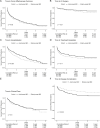Disease- and Treatment-related Complications in Older Patients With Inflammatory Bowel Diseases: Comparison of Adult-onset vs Elderly-onset Disease
- PMID: 33252124
- PMCID: PMC8314101
- DOI: 10.1093/ibd/izaa308
Disease- and Treatment-related Complications in Older Patients With Inflammatory Bowel Diseases: Comparison of Adult-onset vs Elderly-onset Disease
Abstract
Background: The incidence and prevalence of inflammatory bowel diseases (IBD) in older adults are rising. There is a limited comparative assessment of risk of disease- and treatment-related complications in older patients (older than 60 years) with adult-onset (age at disease onset, 18-59 years; AO-IBD) vs elderly-onset IBD (age at disease onset, older than 60 years; EO-IBD). We compared clinical outcomes in older patients with IBD with AO-IBD vs EO-IBD.
Methods: We conducted a retrospective cohort study comparing risk of disease-related complications (IBD-related surgery, hospitalization, treatment escalation, clinical flare, or disease complication) and treatment-related complications (serious infection, malignancy, or death) in older patients with AO-IBD vs EO-IBD through Cox proportional hazard analysis, adjusting for age at cohort entry, disease phenotype, disease duration, prior surgery and/or hospitalization, medication use, disease activity at cohort entry, and comorbidities.
Results: We included 356 older patients with IBD (AO-IBD, 191 patients, 67 ± 5 y at cohort entry; EO-IBD, 165 patients, 72 ± 8 y at cohort entry). No significant differences were observed in the risk of disease-related complications in older patients with prevalent vs incident IBD (adjusted hazard ratio [aHR], 0.85; 95% CI, 0.58-1.25), although risk of IBD-related surgery was lower in older patients with prevalent IBD (aHR, 0.47; 95% CI, 0.25-0.89). Older patients with prevalent IBD were significantly less likely to experience treatment-related complications (aHR, 0.58; 95% CI, 0.39-0.87).
Conclusion: Patients with AO-IBD have lower risk of treatment-related complications as they age compared with patients with EO-IBD, without a significant difference in risk of disease-related complications.
Keywords: Crohn’s disease; aging; biologics; colitis; infections.
© 2020 Crohn’s & Colitis Foundation. Published by Oxford University Press. All rights reserved. For permissions, please e-mail: journals.permissions@oup.com.
Figures


Comment in
-
Maybe Age Isn't Just a Number: Elderly-onset IBD Is a Demographic Deserving of Specific Considerations.Inflamm Bowel Dis. 2021 Jul 27;27(8):1363-1364. doi: 10.1093/ibd/izaa304. Inflamm Bowel Dis. 2021. PMID: 33252131 No abstract available.
References
-
- Coward S, Clement F, Benchimol EI, et al. Past and future burden of inflammatory bowel diseases based on modeling of population-based data. Gastroenterology. 2019;156:1345–1353.e4. - PubMed
-
- Gisbert JP, Chaparro M. Systematic review with meta-analysis: inflammatory bowel disease in the elderly. Aliment Pharmacol Ther. 2014;39:459–477. - PubMed
-
- Beaugerie L, Kirchgesner J. Balancing benefit vs risk of immunosuppressive therapy for individual patients with inflammatory bowel diseases. Clin Gastroenterol Hepatol. 2019;17:370–379. - PubMed

